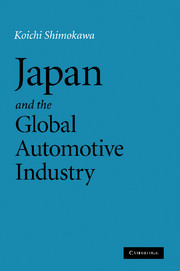Book contents
- Frontmatter
- Contents
- List of figures
- List of tables
- Preface
- Introduction
- 1 Comparing productivity of the Japanese and US automobile industries
- 2 The internationalization of the Japanese automotive industry and local production overseas
- 3 The recovery of European and US auto makers, and relocating and changing lean production
- 4 Early 1990s – the Japanese automotive industry loses international competitiveness, and the development of restructuring strategies
- 5 The restructuring of the global automotive and auto-parts industries
- 6 The restructuring of the world's auto-parts industry and the transfiguration of the keiretsu parts transaction
- 7 Global M&A and the future of the global auto industry – the light and dark sides of merger and re-alignment
- 8 The Asian and ASEAN automotive industries in the global era
- 9 China's automotive industry in the global era, Japanese auto makers, and their China strategies
- 10 Conclusion – the global automotive industry's perspective on the twenty-first century and tasks for the Japanese automotive industry
- Epilogue
- Index
- References
7 - Global M&A and the future of the global auto industry – the light and dark sides of merger and re-alignment
Published online by Cambridge University Press: 06 July 2010
- Frontmatter
- Contents
- List of figures
- List of tables
- Preface
- Introduction
- 1 Comparing productivity of the Japanese and US automobile industries
- 2 The internationalization of the Japanese automotive industry and local production overseas
- 3 The recovery of European and US auto makers, and relocating and changing lean production
- 4 Early 1990s – the Japanese automotive industry loses international competitiveness, and the development of restructuring strategies
- 5 The restructuring of the global automotive and auto-parts industries
- 6 The restructuring of the world's auto-parts industry and the transfiguration of the keiretsu parts transaction
- 7 Global M&A and the future of the global auto industry – the light and dark sides of merger and re-alignment
- 8 The Asian and ASEAN automotive industries in the global era
- 9 China's automotive industry in the global era, Japanese auto makers, and their China strategies
- 10 Conclusion – the global automotive industry's perspective on the twenty-first century and tasks for the Japanese automotive industry
- Epilogue
- Index
- References
Summary
Introduction
GM and Ford's sudden fall into deficit caused a stir. The benefits yielded by the merger of Daimler and Chrysler in 1988 were not as significant as expected, and the Chrysler division remained in deficit for many years. The direct cause of the deficits for all these makers was the business slump in North America, but the so-called legacy costs – health insurance, pension funds, and others agreed under a longstanding labor contract with UAW in North America – were blamed, rather than errors in global strategies. This seems to be an unreasonable and strained excuse.
However, it is undeniable that the three companies showed a pioneering spirit in meeting the challenges of globalization at the beginning of the twenty-first century. Environmental issues of global magnitude, emerging markets – such as Eastern Europe, Russia, and Asia, especially China and India – and global deployment of the entire auto industry were all top of the agenda. Yet despite this pioneering spirit, fundamental errors were made. This chapter looks at those strategic errors and compares them to the successful Renault–Nissan alliance, in particular problems arising from strategic integration and respecting different corporate cultures.
Japanese auto makers are performing well in the age of global restructuring, despite being once seen as lagging behind in the deployment of global strategies and suffering directly as a result. This good performance is seen not only among Toyota, Honda, and other purely Japanese makers, but also among foreign-affiliated makers (except for Mitsubishi Motors).
- Type
- Chapter
- Information
- Japan and the Global Automotive Industry , pp. 203 - 229Publisher: Cambridge University PressPrint publication year: 2010

